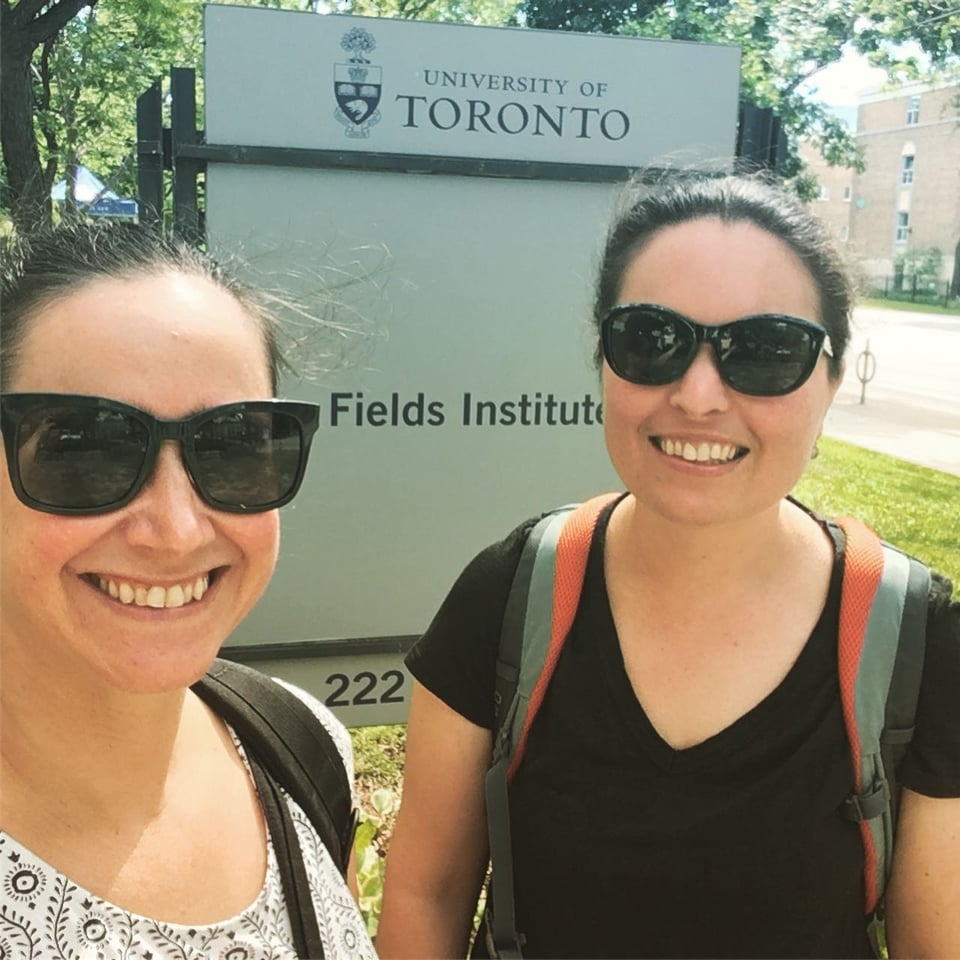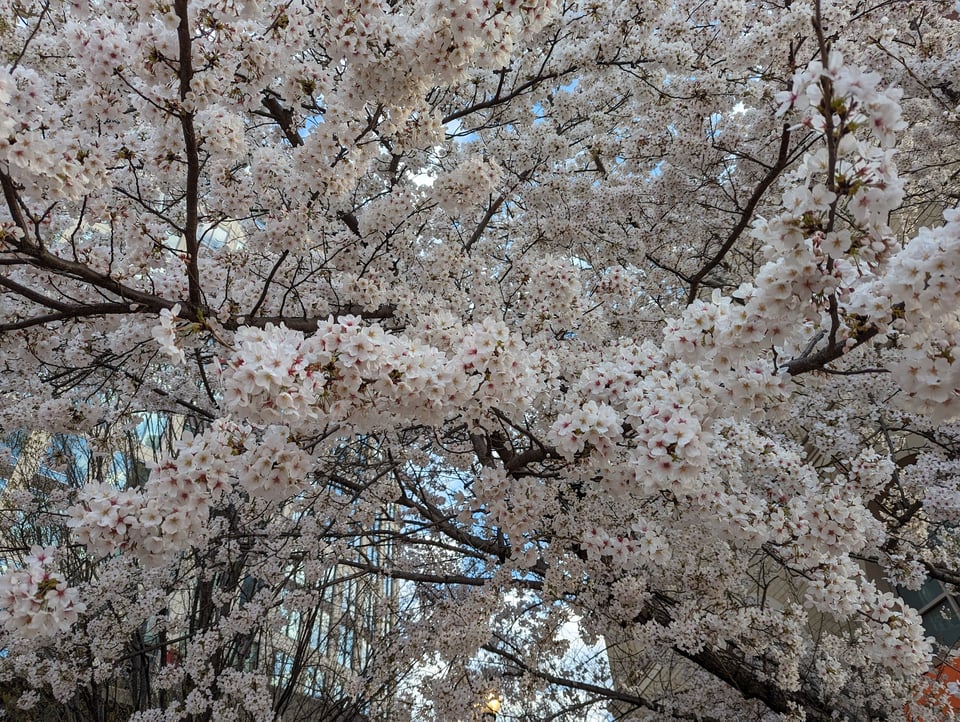on approaching hard problems
Friends, colleagues, and lovers of words,
I usually use this space to talk about books, but today I want to tell you about my friend Adriana Salerno. Like me, Adriana is a mathematician. Here we are together, on a research trip in 2019:

Adriana's on the left, looking pleased with herself: she's the one who remembers to document our time together.
When we first met, I was a postdoc and Adriana was a brand-new faculty member at a small liberal arts college in Maine. Adriana is a phenomenal teacher. It's seductively easy, when you're a math professor, to stand at the board and solve calculus problems. If you're moderately confident, you can persuade your students that the problems will be easy for them, too--until the shock of the test. Adriana refused to take this easy way out. She did the hard, messy, embarrassing-on-all-sides work of getting her students to try problems themselves, to risk failure, to dare admitting they didn't yet understand.
Adriana and I talked about failure a lot, because we were trying to do math research together, and a key aspect of creating new mathematics is being wrong all the time. Many of those conversations were technical; others were everyday mathematician chatter about committees we found frustrating, grants we hadn't gotten, the ever-present mountain of grading.
We talked about personal fears too. We were both getting used to cold places. Adriana, who grew up in Venezuela and went to grad school in Texas, had her position in Maine; soon after we met, I accepted a tenure-track position in western Wisconsin. I didn't know if my spouse could find good work in my new location. In her own small town, Adriana despaired of even finding a date. Distant loved ones were even greater sources of stress. I was worried about my sister, who was trying to get by in New York City on bartending tips and student loans. As food shortages and kidnappings mounted in Venezuela, Adriana was terrified for her family there.
Time passed, and our careers prospered. We recruited some amazing collaborators and wrote some good papers; we developed a workshop for new professors about math anxiety; we both got tenure. Adriana earned the Haimo Award for extraordinarily successful university math teaching. She ran for vice-president of the Mathematical Association of America, and won.
Some of our old personal worries were resolving. I took a job in a new city where my spouse found good work as an engineer. My sister finished her degree program and started a psychotherapy practice. Adriana's mom moved to the U.S.
Then one January, after a long day of talks at the Joint Mathematics Meetings, Adriana went out for a drink with a mathematician from Maryland--and fell in love.
Dave and his ex shared custody of his daughter, so he wasn't geographically flexible. As their relationship grew more serious, Adriana mused about moving closer. Her daydreams focused on Washington, D.C. She had interned there once, working as a science journalist at the Voice of America, and knew she loved the city.
In 2021, Adriana began a new job at the National Science Foundation with excitement and trepidation. This was a temporary, "rotator" position: she would be a mathematical expert, finding the right people to evaluate grant applications and coordinating the ensuing discussions. Stepping away from teaching was frightening, but the skills of coordination and communication that Adriana had honed in the classroom mattered here, too. And again, it was temporary. She could always go back to Maine.
Then she got cancer.
That's a horrible sentence to hear in any context, but especially when someone is writing a long letter about an old friend, so let me tell you up front: Adriana is a breast cancer survivor. There was an awful year where our weekly meetings were all about surgery side effects and high-pressure chambers, but we got through it. I flew out to visit her while the cherry-trees were in bloom.

Because of the cancer, Adriana's academic job granted her an extra year of leave. But at the beginning of this year, she had to make a choice. Would she return to her role as a professor? Or would she stay at the National Science Foundation, which had already offered her a permanent position?
Adriana missed her students, but she knew that as part of the NSF, she was making a difference for mathematics--not just the discipline, but the impacts of mathematics on society as a whole. (That's an official NSF website link; here's the Valentine's Day 2025 version of it, just in case.) She wanted to stay close to the doctors she trusted, who had helped her get through cancer. She wanted to stay near Dave.
This January, Adriana resigned her position as a tenured professor. She was a little bit wistful, but mostly she was busy. This time of year is panel season at the NSF, when mathematicians travel from all around the U.S. (and sometimes the world) to debate grants and evaluate proposals, and Adriana had a ton of work to do.
On Tuesday morning, we were supposed to Zoom about research. We've been mentoring a group of junior researchers, and one of them is stuck on a problem that seems to require meticulous analysis of twelve different cases; Adriana and I have been trying to identify a simpler approach.
But we didn't get to talk about how to help Thais, because Adriana was called into an unexpected Zoom meeting at the NSF. At the end of the meeting, she--along with the rest of the recently promoted, permanent NSF staff members--was fired.
This is a bunch of things. Huge. Illegal. Terrifying. Blatant defiance of the laws passed by Congress. When my friend and I started talking about solving hard problems, all those years ago, this is not the kind of problem we had in mind.
But something Adriana and I have talked about over and over is that dealing with your feelings about hard problems isn't a distraction from the work; it's part of the work. So I'm reaching out to you, through text and symbol, to say: let's work together. When somebody asks you why decisions in Washington matter, here's a story you can share.
This is my friend, the mathematician who brings humans together, the cancer survivor. One of the problems she's trying to solve right now is health insurance.

Yours,
Ursula.